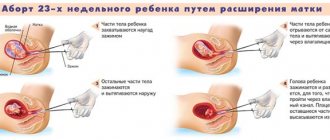Mifegin is a French antigestagenic drug that is used in obstetric and gynecological practice to increase uterine tone and stimulate the contractile activity of the myometrium. Mifegin is well tolerated by patients and highly effective.
Pharmacological properties
A synthetic steroid antigestagenic drug (blocks the action of progesterone at the receptor level), does not have gestagenic activity. Antagonism with GCS was noted (due to competition at the level of communication with receptors).
Increases the contractility of the myometrium, stimulating the release of interleukin-8 in choriodecidual cells, increasing the sensitivity of the myometrium to prostaglandins (used in combination with a synthetic prostaglandin analogue to enhance the effect). As a result of the action of the drug, desquamation of the decidua and expulsion of the fertilized egg occurs.
Pharmacokinetics
After a single oral dose of 600 mg, Cmax 1.98 mg/l is achieved after 1.3 hours. Absolute bioavailability is 69%.
In plasma, mifepristone is 98% bound to proteins: albumin and acidic alpha1-glycoprotein.
After the distribution phase, excretion occurs slowly at first, the concentration decreases by half between 12-72 hours, then more quickly. T1/2 is 18 hours.
History of Mifegin
Mifegin (France, tablets, 200 mg) is a synthetic steroid drug for oral use. Currently, Mifegin, a progesterone receptor antagonist widely used for medical abortions, is registered in more than 40 countries and is included by the World Health Organization in the “Model List of Essential Medicines”. Having a high affinity for progesterone receptors, mifepristone acts as its antagonist. The mechanism of action is based on the antiprogesterone effect - blocking the action of progesterone at the level of receptors in the endometrium and myometrium, which in turn leads to suppression of the development of the fertilized egg, damage and rejection of the decidua, the appearance of uterine contractions, the development of menstrual-like bleeding, which is clinically manifested by medical termination of pregnancy.
Mifegin in the world
1980 A molecule with a strong anti-progesterone effect was created, which was named RU-486 (the international non-proprietary name for mifepristone).
1982 Doctors-researchers at Roussel-Uclaf and INSERM have published the results of the first clinical trials of the use of the mifegin tablet for medical abortion (prototype name “RU-486” or mifepristone).
Mifegyne logo 1988 The Ministry of Health of the French Republic has approved the use of Mifegyne® (mifepristone) in combination with prostaglandin in hospitals and medical clinics where abortion is permitted.
1991 Mifegyne® is approved for use in the UK and Sweden.
1997 in France was created to ensure continuous production, research and development of Mifegin tablets throughout the world (excluding the USA).
Distribution of mifegin around the world 1999 Mifegin ® has become available in several European countries and far beyond its borders (Austria, Belgium, Denmark, Finland, Germany, Greece, the Netherlands, Luxembourg, Norway, Spain, Switzerland, Russia, Ukraine, Tunisia, Israel, South Africa, New Zealand) .
2005 The World Health Organization (WHO) included Mifegin in the list of essential medicines.
2012 Approval of regimens and dosages recommended for medical termination of pregnancy up to 49 days of amenorrhea in most countries.
Mifegin tablets were officially registered in 1999 and approved for use for abortion in the Russian Federation according to the instructions. The price of Mifegin in Moscow and the regions is determined by the official distributor.
Manufacturer information: Exelgyn company, France, Exelgyn laboratories, 254 Boulevard Saint Germain, F-75007, Paris - France.
₽ 12,000/abortion with mifegin
access_time
Make an appointment for an abortion urgently
Contraindications
- chronic adrenal insufficiency
- hypersensitivity to mifepristone or to any of the excipients
- severe asthma not controlled by therapy
- hereditary porphyria
- pregnancy after 63 days of amenorrhea
- pregnancy that occurred during the use of intrauterine contraceptives or after discontinuation of hormonal contraception
- severe gestosis, preeclampsia, eclampsia
- premature or post-term pregnancy
- suspected ectopic pregnancy
- pregnancy from 84 days from amenorrhea and above
- contraindications to the choice of prostaglandin analogue
- inflammatory diseases of the genital organs
To prepare and induce labor:
- severe gestosis, preeclampsia, eclampsia
- premature or post-term pregnancy
- placenta previa
- discrepancy between the sizes of the fetal head and the woman’s pelvis
- abnormal fetal position
- bloody discharge from the genital tract of unknown etiology
Prescribed with caution for chronic obstructive pulmonary diseases (including bronchial asthma), arterial hypertension, arrhythmia, chronic heart failure.
Reviews from women
Maria, 32 years old : “There was a situation in my life when I had to terminate my pregnancy in the first months, as I had serious health problems, I suffered from infections and inflammation in the uterus. They said that the fetus would have pathologies if it survived. Then the gynecologist suggested the drug Mifegin instead of a standard abortion, I decided to try it because I was afraid I wouldn’t survive. As it was written in the testimony, I took three tablets at once, then they followed me and carried out tests. I experienced bleeding and abdominal pain, but it went away after a couple of hours. Then the fetus came out naturally. They left me in the hospital for another day, and a week later I came for a re-examination and everything was fine, so I advise you to take the drug Mifegin, but only in the hospital!”
Valeria, 28 years old : “The first pregnancy could not last even two months, since the child died at the very beginning. The uterus had to be stimulated for removal surgery. I don’t know about others, but I had no adverse reactions. I just took Mifegin tablets for two days, came for the procedure and woke up two hours later in a cheerful state. The operation was successful, and now I am pregnant with our baby. As tests show, there are no pathologies from taking Mifegin, as well as no risks to my health.”
Directions for use and doses
For medical termination of pregnancy: 600 mg of mifepristone (3 tablets of 200 mg each) is taken orally once in the presence of a doctor. The patient should be under the supervision of medical personnel for at least 2 hours after use. 36-48 hours after taking Mifegin®, the patient should appear for ultrasound control. After 8-14 days, a clinical examination and ultrasound control are repeated, and the level of beta-chorionic hormone is determined to confirm that a miscarriage has occurred. If there is no effect from the use of the drug on day 14 (incomplete abortion or ongoing pregnancy), vacuum aspiration is performed, followed by histological examination of the aspirate.
For preparation and induction of labor: a single dose of 200 mg Mifegin (1 tablet/day) orally in the presence of a doctor. After 24 hours, repeat administration of 200 mg. After 48-72 hours, the condition of the birth canal is assessed, and, if necessary, prostaglandins or oxytocin are prescribed.
The drug should only be used in medical institutions under the supervision of a physician.
Why do doctors trust their choice of Mifegin®?
In a clinic where a medical abortion is performed, the doctor will definitely suggest using Mifegin. There are reasons for this:
- Mifegin ®
has been proven to be highly effective – 98-99%; - high safety confirmed by clinical studies;
- approved for use in most countries of the world;
- has a minimal risk of developing serious complications if the regimens for using the original drugs are carefully followed.
Also among the advantages it is worth noting the affordable price of the drug Mifegin. The entire medical abortion, including all examinations and a guarantee card for free treatment in case of complications, does not exceed 5-6 thousand rubles in our clinic in St. Petersburg.
MAKE AN APPOINTMENT
Abortion and contraception clinic in St. Petersburg - department of the medical gynecological association "Diana"
Make an appointment, tests or ultrasound via the contact form or by calling +8 (812) 62-962-77. We work seven days a week from 09:00 to 21:00.
We are located in the Krasnogvardeisky district, next to the Novocherkasskaya, Ploshchad Alexander Nevsky and Ladozhskaya metro stations.
The cost of a medical abortion in our clinic is 3,300 rubles. The price includes all pills, an examination by a gynecologist and an ultrasound to determine the timing of pregnancy.
Share link:
Side effect
Bloody discharge from the genital tract, discomfort and pain in the lower abdomen, exacerbation of inflammatory processes of the uterus and appendages, weakness, headache, nausea, vomiting, diarrhea, dizziness, hyperthermia, urticaria.
During combination treatment with misoprostol (additionally): vaginitis, dyspepsia, insomnia, asthenia, leg pain, anxiety, anemia, decrease in hemoglobin (more than 2 g/dl), fainting, leucorrhoea.
Overdose
Taking mifepristone in doses up to 2 g does not cause adverse reactions. In cases of drug overdose, adrenal insufficiency may occur.
Drug interactions
Before starting treatment with Mifegin tablets, you need to inform your doctor about taking other medications, otherwise you may experience side effects or a decrease in the effectiveness of the tablets.
So you should not combine Mifegin tablets with:
- Non-steroidal anti-inflammatory drugs;
- Non-narcotic analgesics;
- Glucocorticosteroids;
- Anesthesia drugs.
All these tablets can reduce the effectiveness of treatment with the drug, sometimes cause bleeding and increased symptoms. Therefore, the combination is prohibited or the dosage will be much less and the course will be minimal.
special instructions
Patients should be informed that if on the 10-14th day there is no effect from the use of the drug (incomplete abortion or ongoing pregnancy), the pregnancy should be terminated in another way, since the formation of congenital malformations in the fetus is possible.
The use of the drug requires the prevention of Rh allo immunization and other general measures accompanying abortion.
Patients with artificial heart valves or infective endocarditis should be treated with prophylactic antibiotics when using Mifegin.
The drug should be used in obstetrics and gynecology medical institutions that have the appropriate license, trained medical personnel and the necessary equipment.
Analogues substitutes
The main substitutes for Mifegin tablets are products of the following type:
- Mytholiana;
- Mifeprexa;
- Pencrofton;
- Ginestril.
Photo gallery of analogues:
Mifolian Mifeprex Pencrofton Ginestril
Since they have the same active substance, group, pharmacological action, indications.
Their price is 2000-4000 rubles, but they are also prescribed with the permission of a doctor, in a hospital setting.
Manufacturer
EXELGYN Laboratoires produced by MACORS Laboratoires, marketing and distribution in the Russian Federation IZVARINO PHARMA LLC
| The description posted on this page is a shortened and expanded version of the official version of the annotation for the drug. The information is presented for informational purposes only and should not serve as a basis for making an independent decision on the use of a particular medicinal product. It is necessary to consult with a specialist and use the instructions approved by the manufacturer. |







